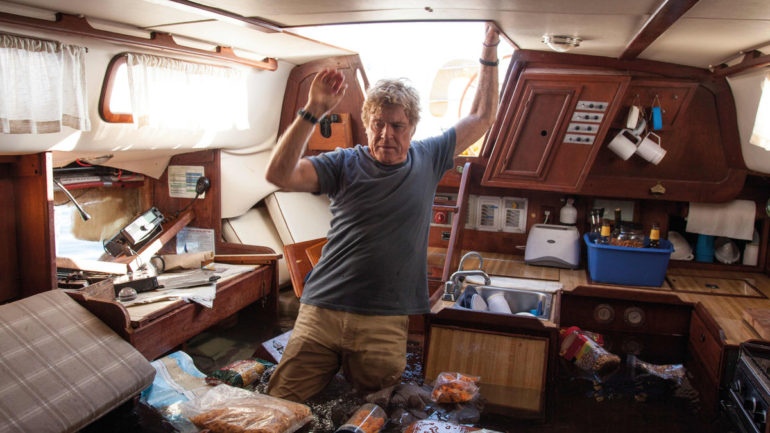If Hollywood is to be believed, if you want to see mankind at its most desperate and inspiring, you have to go to sea. For the second year in a row, for our consideration we are presented with a man adrift with little but his wits and his resilience to see him through. Still, Pi Patel at least had a tiger and (briefly) a zebra for company. The unnamed mariner (Robert Redford) at the heart of J.C. Chandor’s All Is Lost has no-one. Hints are given at a family life back on dry land, but a lot feels lost before our tale even begins.”
Given how much grander and more effects-driven last year’s Life Of Pi was, it’s surprising to see All Is Lost’s more minimalist take on similar events follow it up. Arguably, All Is Lost has less to say than Ang Lee’s film, but the fact that there’s little in the way of allegory or commentary just means its core story is unimpeded (Indeed, after Gravity’s unsubtle religious metaphors, it might even seem refreshing). The film opens with a voiceover of our protagonist reading a letter composed to loved ones on dry land, but then we cut and any possibility of outside contact or assistance is taken away. Named as ‘our man’ in the credits, Redford’s character awakens on his yacht, the Virginia Jean, to discover the hold flooding after it’s been breached and broken by a shipping container adrift in the ocean. Thus begins his mission to patch the hole and get the good ship Jean going again. The simplicity of his title, ‘our man’, is part of what makes All Is Lost work. We watch him slowly but assuredly seal the breach, applying pastes and wooden slats, before authoritatively readying his sails and preparing to continue with the voyage. This man is not defined by a name, but by his actions. Keep calm and carry on, as the wartime slogan said. The opening monologue sets our man up clearly; “I think you would all agree that I tried. To be true, to be strong, to be kind, to love, to be right.” He’s clearly an experienced and seasoned mariner, and in Hollywood few personalities are as experienced and seasoned as Robert Redford.
Redford’s standing as a Hollywood elder stands to him in his performance. His dashing looks absolutely owned the screen once upon a time, but the man who gave us Sundance is a Kid no more. He’s appeared onscreen relatively little in the last two decades, so to see how those matinée icon looks have faded feels like a man embracing old age. There’s no vanity here; with no co-stars and barely fifty words of dialogue in the entire film, Redford is front and centre. Rough hands scour maps and strain shows in every wrinkle as he adjusts his sails and rigging. Being made so aware of our lead’s age also highlights Redford’s remarkable physical performance. As he sails on from the yacht’s initial mishap, storms roll in. Redford is thrown about the yacht like a rag doll on a spin cycle. It is genuinely impressive to see a 77-year-old hang from the sides and mast of his yacht with the dedication and nous of a real mariner. It’s a challenge for any actor, let alone one so well known and so much older than his classic image.
As the storm batters the damaged vessel, Chandor never gives Redford a moment to let his guard slip. He shoots tight and close (which means the occasional CGI background does stick out), and gives a kinetic energy to his stripped-down script. His previous effort, the slick and biting Margin Call, boasted great performances but never felt particularly cinematic. Here, Chandor revels in cinema’s ability to make a lot from a little. The first half of the film takes place entirely in and around the yacht, whilst the second act action transfers to the even more restrictive setting of an inflatable dinghy. The stricken Virginia Jean ultimately succumbs to the elements, and our man is pushed to his absolute limits. There’s never a lot onscreen to hold the attention outside of Redford, but we’re invested in his plight all the way through. In his eyes is a barebones survivalist instinct that anyone could relate to if pushed so far. A mishap in the dinghy leads to Redford exploding in a primal and empathetic moment, the point when it genuinely starts to feel like all is lost. Fate and nature are cruel opponents, especially when they seem to collude against us. Redford and Chandor chart the necessary fightback with dignity and few frills, but plenty of thrills. The outcome is unsure, but All Is Lost‘s technique is masterful, and the central performance by Redford is a sure and steady anchor.

